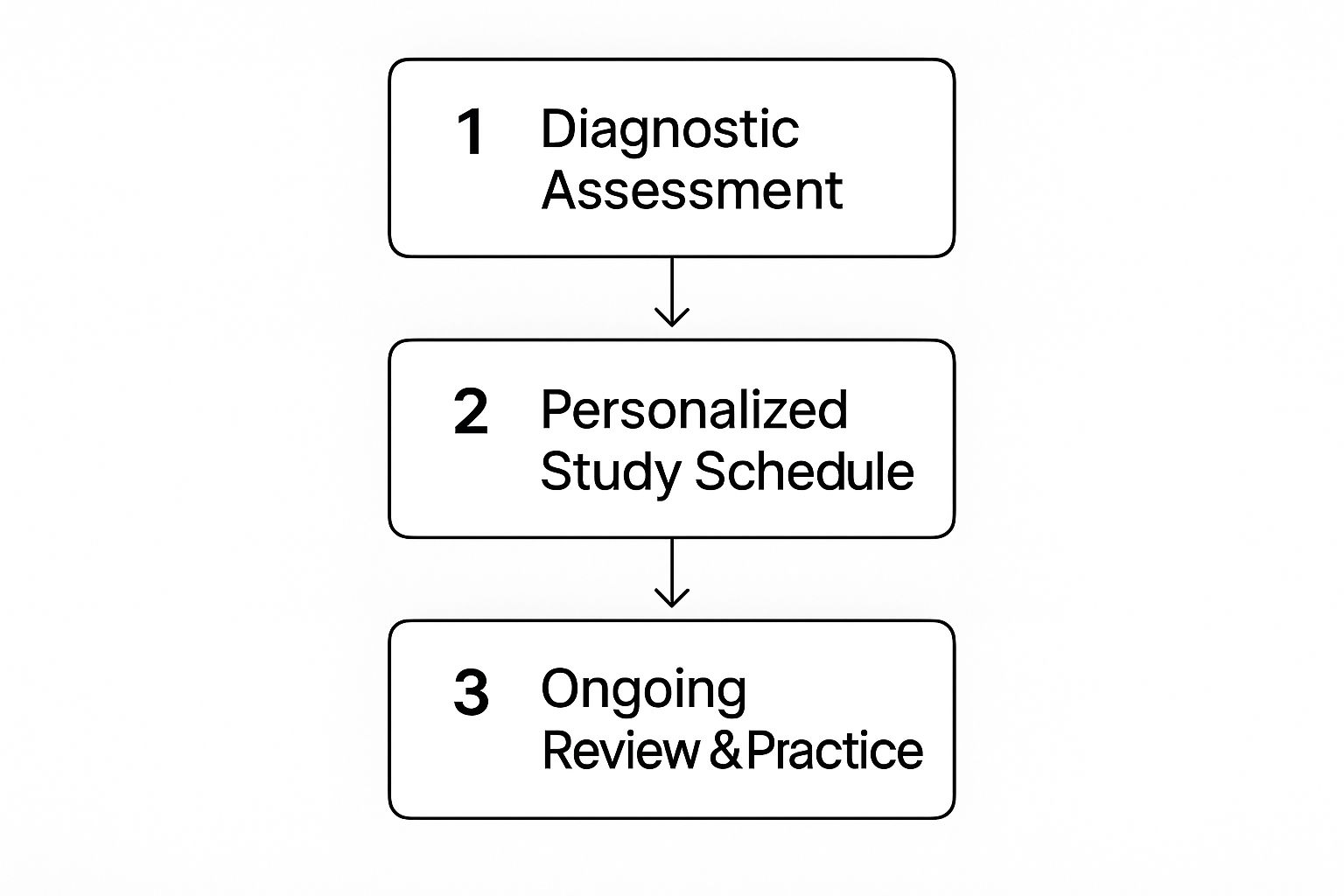Preparing for the MCAT isn't just about cramming facts; it's a marathon that demands a smart, structured game plan. The best approach is to start with a diagnostic test to see where you stand, then build a detailed study schedule, and make sure you're constantly mixing content review with practice exams. This is how you cover everything you need to without burning out before test day.
Building Your MCAT Study Foundation
Every successful MCAT prep journey starts with a solid strategic framework. Seriously, before you even think about glycolysis or Newtonian physics, you need to figure out your starting point and your destination. This foundational phase is all about honest self-assessment, setting realistic goals, and creating a timeline that works for your life.
Set Your Target Score and Timeline
First things first: what's a "good" score for you? This isn't a random number. You'll need to do a little research into the average MCAT scores for the medical schools on your list.
For context, recent data shows the average score for all test-takers is hovering around 506.5. However, students actually getting into MD programs average closer to 511.9, which tells you just how competitive things are. Setting a clear, ambitious, yet achievable score goal is what will keep you going on the tough days.
Once you have that target score, you can work backward to build your study schedule. How much time you need really depends on your science background and what else you have going on.
To help you visualize what this looks like, here’s a quick comparison of common study timelines.
MCAT Study Timeline Scenarios
This table breaks down a few typical study plans. Use it to find an approach that fits your personal schedule and commitments.
| Study Period | Weekly Hours | Content Review Phase | Practice Test Phase | Best For |
|---|---|---|---|---|
| 3 Months | 25-30 | Weeks 1-6 | Weeks 7-12 | Students with a completely free schedule, like during a summer break. |
| 4-5 Months | 20-25 | Weeks 1-8 | Weeks 9-18 | Students taking a light course load or working a very flexible part-time job. |
| 6 Months | 15-20 | Weeks 1-12 | Weeks 13-24 | Students balancing a full course load or a regular part-time job. |
| 9+ Months | 10-15 | Weeks 1-20 | Weeks 21-36 | Non-traditional students or those with significant work/family commitments. |
Choosing the right timeline from the start is crucial for preventing burnout and ensuring you have enough time to master the material without rushing.
For a deeper dive into figuring out your ideal start date, you can explore our guide here: https://acemedboards.com/when-should-i-start-studying-for-the-mcat/
This visual really sums up the whole process.

As you can see, effective prep is a cycle: you assess, you plan, and you practice consistently. It’s not a one-and-done deal.
Start with a Diagnostic Exam
Before you crack open a single review book, you need to take a full-length diagnostic practice test. This is non-negotiable. Don't worry about the score itself—that’s not the point. The goal is to get a raw, unbiased snapshot of your strengths and weaknesses across all four sections.
Your diagnostic test is your roadmap. It tells you which areas need a complete rebuild and which just need a little polish, saving you countless hours of misdirected effort.
Analyzing the results from this initial test will become the backbone of your entire study plan. It ensures you’re focusing your energy where it will make the biggest impact. To keep yourself accountable and build strong study habits from day one, try using a free habit tracker printable. This little bit of planning upfront prevents so much wasted time and helps you build momentum right away.
Mastering MCAT Content Strategically

Let's be real: reviewing content for the MCAT isn't about re-reading your old college textbooks cover to cover. That's a surefire way to burn out. This exam covers a massive amount of information, so your success really boils down to how smart and efficient you are with your time.
The goal is to get past simply memorizing facts. You need to truly engage with the material and build a deep, lasting understanding. That means focusing your precious study hours on what actually matters on test day, not on every obscure detail you once learned in your undergrad courses.
Prioritize High-Yield Topics First
Not all MCAT topics are weighted equally. While the AAMC provides a detailed outline, experienced test-takers know that some subjects show up far more often than others. We call these high-yield topics.
Think of your study time like a budget. Would you spend ten hours mastering a niche organic chemistry reaction that might appear once every few years? Or would you spend that same time mastering amino acids, which are practically guaranteed to be on your exam? The choice is obvious.
Focusing on high-yield content is the backbone of any successful MCAT prep plan. It’s how you make sure your energy is going toward the areas that will actually earn you the most points.
So, how do you figure out what's high-yield? You can start by using resources that have already done the heavy lifting. Our guide on MCAT high-yield topics is the perfect place to begin building a focused content review schedule. This approach stops you from getting lost in the weeds of low-impact details.
Adopt Active Learning Techniques
Passively re-reading your notes or zoning out during a lecture video is one of the biggest time-sinks in MCAT prep. Your brain simply doesn't store information effectively that way. To make knowledge stick, you have to work with it actively.
Here are a few powerful methods you can weave into your study sessions:
- The Feynman Technique: Grab a whiteboard and try to explain a complex topic, like the electron transport chain, as if you were teaching it to a 12-year-old. The second you get stuck or have to use jargon, you’ve found a gap in your own understanding.
- Concept Mapping: Ditch the linear notes. Instead, draw out the connections between ideas. For example, a concept map could link the physics of fluid dynamics directly to the physiology of the circulatory system, helping you think in the interdisciplinary way the MCAT demands.
- Practice Questions: This is active learning at its core. Answering questions forces you to pull information from your memory and apply it, which is far more powerful than just reading it over and over again.
These techniques shift studying from a passive chore into an active process of discovery, making every hour you put in count for more.
Use Spaced Repetition for Long-Term Recall
The MCAT is going to test you on concepts you might not have seen since your freshman year. How do you keep it all fresh? The answer is spaced repetition. This technique is all about reviewing information at increasing intervals over time, right before you’re about to forget it.
Instead of cramming a topic for six hours and then ignoring it for weeks, spaced repetition keeps the material bubbling just below the surface. It's scientifically proven to dramatically improve long-term memory.
- Anki: This free flashcard program is the gold standard for spaced repetition. You can make your own cards or download incredible, high-quality decks made by other med students.
- Daily Review: Just 15-20 minutes each morning is all it takes. Run through your flashcards from previous topics. It’s a small daily habit that pays massive dividends over the long haul, keeping old content fresh as you tackle new material.
By making spaced repetition a non-negotiable part of your routine, you’re constantly strengthening your knowledge base. What you learned in month one will still be there for you in month five.
Choosing the Right Prep Materials
It’s easy to get overwhelmed by the sheer volume of MCAT prep resources out there. You might feel like you need to buy everything to succeed, but you don't. A lean, effective toolkit is all you need.
A solid resource plan really only needs three core components:
- A Set of Content Review Books: Pick one comprehensive set from a reputable publisher (like Kaplan, Princeton Review, or Examkrackers) and stick with it.
- A Large Question Bank (QBank): A resource like UWorld is invaluable. It provides thousands of practice questions with fantastic explanations, which is critical for active learning and finding your weak spots.
- Official AAMC Materials: These are absolutely non-negotiable. The AAMC’s official practice exams, section banks, and question packs are the closest you can get to the real thing. Save them for the final stretch of your prep.
Resist the urge to buy multiple sets of review books. It’s a common mistake that just leads to confusion. Pick one, learn it inside and out, and use your QBank to fill in the gaps. This focused approach is far more effective—and much easier on your wallet.
Using Practice to Drive Your Score Up
Knowing the Krebs cycle cold or having thermodynamics down pat is a great start, but it's only half the battle. The real test of MCAT readiness is whether you can apply that knowledge under the intense pressure of a multi-hour, high-stakes exam. This is where strategic practice comes in, turning what you know into actual points on your score report.
Integrating practice isn’t just about churning through thousands of questions. It's a deliberate cycle of testing, analyzing, and refining your approach. You have to know when to start, what to focus on, and how to learn from every single mistake. This is where all that hard work from your content review phase really starts to pay off.
When Should I Start Doing Practice Questions?
The short answer? Immediately.
Don’t fall into the common trap of thinking you need to master every chapter of every book before attempting a single question. That's a classic mistake that just delays the development of crucial test-taking skills.
Start weaving in practice questions from day one. When you finish a study block on, say, endocrinology, immediately dive into a set of 15-20 questions on that specific topic. This does two powerful things: it cements what you just learned, and it forces you to start thinking like the test-makers right from the beginning.
This early practice helps you spot knowledge gaps in real-time. It’s far more effective to realize you don’t quite get peptide hormones right after studying them than to have that bombshell drop during a full-length exam three months down the road.
The Rhythm of Full-Length Practice Exams
Taking full-length practice exams (FLs) is the absolute cornerstone of MCAT prep. They are essential for building the mental stamina you'll need for the nearly eight-hour ordeal on test day. More importantly, they provide the most valuable data you have on your progress.
But there's a cadence to it. Doing them too often leads to burnout, while not doing them enough leaves you underprepared.
- First Half of Prep: In the initial phase of your study plan, aim to take one full-length exam every 2-3 weeks. This gives you plenty of time to do a deep, thorough review of your performance and adjust your content study without getting overwhelmed.
- Last 4-6 Weeks: As you approach your test date, ramp it up to one full-length exam per week. This gets you into a test-taking rhythm and helps you peak at just the right time.
Don't underestimate the grind. Serious MCAT prep often takes more than 300 total study hours to cover the four massive sections. Building cognitive endurance through these practice exams is a non-negotiable part of that process.
Here's a quick look at what you're up against on test day:
MCAT Section Timing and Question Breakdown
| MCAT Section | Number of Questions | Time Allotted (minutes) | Focus Area |
|---|---|---|---|
| Chem/Phys | 59 | 95 | Chemistry, Physics, Biochemistry, Biology, Organic Chemistry |
| CARS | 53 | 90 | Critical Analysis and Reasoning Skills |
| Bio/Biochem | 59 | 95 | Biology, Biochemistry, Organic Chemistry, General Chemistry |
| Psych/Soc | 59 | 95 | Psychology, Sociology, Biology |
Each section demands a unique blend of content knowledge and strategic pacing, which is exactly what regular practice helps you develop.
The Post-Exam Review Is Where the Magic Happens
The day after your practice exam is arguably more important than the day you took it. A score is just a number; the real learning happens when you dig into a deep, honest analysis of your performance. Simply looking at what you got wrong isn’t nearly enough.
For every single question—yes, even the ones you got right—you need to ask yourself a few key things:
- Why was my answer wrong? Get specific. Did you misread the passage? Make a dumb calculation error? Or was it a pure content gap?
- Why is the correct answer right? Don't just nod and accept it. You should be able to explain the reasoning behind the correct choice in your own words.
- Was this a content gap or a strategy error? This distinction is critical because it tells you exactly what you need to fix.
This meticulous review process can easily take a full 6-8 hours, but it's the single most effective way to turn your mistakes into real, tangible score increases.
Content Gaps vs. Strategy Errors: Know the Difference
Every mistake you make falls into one of two buckets. Figuring out which bucket it belongs to is the key to fixing the problem.
Content Gap: This is straightforward—you just didn't know the information. Maybe you couldn't remember the function of the spleen or blanked on the formula for kinetic energy. The fix is to go back to your review books, watch a video on the topic, and make some new flashcards.
Strategy Error: This one is more frustrating. You knew the material but still missed the question. This happens when you misread the question stem, misinterpret a graph, fall for a trap answer, or simply run out of time. The fix here is to focus on your technique.
I highly recommend keeping an error log in a simple spreadsheet. Track your mistakes and categorize them. Pretty soon, you'll see patterns emerge. If you're seeing a ton of content gaps in organic chemistry, you know where to focus your review. If strategy errors are piling up, it's time to refine your approach. For a deeper dive into technique, our guide on MCAT test-taking strategies offers some really practical advice.
Mastering Your Timing and Pacing
The MCAT is a marathon, but it's run at a sprint's pace. You're always racing the clock, and nowhere is that more obvious than in the CARS section. The only way to get faster without sacrificing accuracy is through deliberate, timed practice.
Pacing isn't about rushing. It's about developing an internal clock that lets you move through passages efficiently, giving each question the attention it deserves without getting bogged down.
Start small. Time yourself on individual passages. For a standard CARS passage, give yourself 10 minutes to read it and answer the questions. Once that feels comfortable, try to shave it down to 9 minutes. This kind of targeted drill builds the muscle memory you need to navigate each section confidently on test day, ensuring you don't leave easy points on the table just because time ran out.
How to Analyze and Adapt Your Strategy

Let's be honest: that first practice exam score can feel like a punch to the gut. Seeing a number that’s miles away from your goal is discouraging, but you have to reframe this feeling immediately. That score isn't a final judgment—it’s just data. And right now, data is your best friend.
Simply taking one practice test after another without changing anything is a surefire way to stay stuck. The real score jumps happen between the tests, when you dig into your performance, figure out the story behind your mistakes, and use that knowledge to tweak your study plan.
Build and Master Your Error Log
The single most powerful tool for this is an error log. This isn't just a list of wrong answers. It can be a simple spreadsheet or a dedicated notebook, but its job is to turn frustrating mistakes into genuine learning moments.
For every single question you review—yes, even the ones you got right by guessing—you should log it. A truly effective error log forces you to diagnose the root cause of your mistake. Were you fuzzy on the content? Did you misread the question? Did you fall for a cleverly worded trap answer?
Your error log is your personal diagnostic tool. It shifts the question from "What did I get wrong?" to "Why did I get it wrong?"—and that's the question that actually leads to a higher score.
This kind of detailed tracking will quickly show you patterns you’d otherwise miss. You might think you're weak in "biochemistry," but your log reveals the real problem is just interpreting enzyme kinetics graphs. That level of detail is gold because it lets you study with laser focus.
From Raw Score to Actionable Insights
Looking past your overall score is where the real strategy begins. You need to dissect your performance section by section, even passage by passage. How did CARS compare to Bio/Biochem? Did your accuracy tank in the last section, hinting at mental fatigue?
It also helps to know where you stand in the bigger picture. The MCAT total score runs from 472 to 528, with the average hovering around 500.5. But to be a truly competitive applicant, you should be aiming for a score above the 75th percentile, which is typically greater than 508. Nudging your score up to 512 or higher puts you in the top 15% of all test-takers, a position that definitely gets noticed on applications. You can find more details on MCAT score statistics and percentiles on bestcolleges.com.
Use this context to set small, achievable goals. If you're aiming for a 512 and you're currently at a 504, where can you find those eight points most efficiently? It's almost never an even split. Maybe your Chem/Phys section is your weak link, and a focused review of physics formulas could bag you 3-4 points much faster than trying to grind out one more point in your strongest section.
Adjusting Your Study Plan in Real-Time
Think of your study schedule as a dynamic roadmap, not a static document carved in stone. Your error log and performance analysis are the GPS, telling you exactly when and where to make a turn.
Here’s what this looks like in the real world:
- Week 4 Analysis: While reviewing your error log, you see a clear pattern: you're consistently missing questions about experimental design in the Psych/Soc section.
- Week 5 Action: Instead of just moving on to the next topic on your schedule, you pivot. You swap out two of your planned content blocks and dedicate them to Psych/Soc, specifically watching videos on research methods and drilling passages that test study design.
This constant feedback loop ensures you’re always patching up your weakest areas. It's the difference between blindly marching forward and strategically navigating your way to your goal score.
Common Problems and How to Adapt:
- Running out of time? Dedicate specific sessions to timed passage drills. Start with extra time and slowly tighten the clock until you're at pace.
- Making careless errors? You need to slow down to speed up. Force yourself to highlight key phrases in the question and physically cross out wrong answers on your scratch paper.
- Still weak in a content area? It's time to go back to basics. Re-read the chapter in your prep book, find a good YouTube video that explains it differently, and make a new, targeted set of flashcards.
By constantly analyzing and adapting, you take charge of your MCAT prep. You're no longer just reacting to your practice scores—you're actively building your path to a better one.
Building Mental Endurance for Test Day

Let’s be honest: the MCAT is as much a mental marathon as it is a test of your science knowledge. You can spend months cramming facts and formulas, but if your head isn't in the right space on test day, all that hard work can be undermined.
Building the stamina to stay sharp, focused, and calm for over seven hours is a skill you have to practice. This final phase of your prep is less about learning new material and more about cultivating resilience. It's about making sure that a tough passage or a wave of anxiety doesn't derail your performance. A strong mental game is often what separates a good score from a great one.
Crafting Your Test Day Routine
The last thing you want on test day is a bunch of surprises. Your goal should be to make the entire experience feel as familiar and automatic as possible, which frees up your brainpower for the exam itself.
The best way to do this is to run a full dress rehearsal during your final few practice exams. This isn't just about the test; it’s about the whole routine, from the moment you wake up to when you walk into the testing center.
- The Night Before: Get everything ready. Lay out your clothes, pack your snacks and drinks, and make sure your ID and test confirmation are in your bag. Seriously, stop studying by early evening and do something that lets your brain relax.
- The Morning Of: Wake up at the same time you will on the actual day. Eat the exact breakfast you plan to eat. If you can, do a practice run of your drive to the testing center to get a real sense of traffic and parking.
When you've practiced the logistics, you can walk in feeling like you're in control, not like you're reacting to chaos.
Mastering the Art of the Break
Those scheduled breaks are your secret weapon, but only if you use them correctly. They aren't just downtime; they're your chance to hit the reset button. Using them poorly can absolutely tank your performance in the next section.
Do not use your break to frantically review notes or agonize over the section you just finished. Your brain needs a genuine rest to clear out the cognitive clutter and prepare for the next challenge.
Have a specific plan for each break. Go to the restroom, walk around and stretch, and eat a small, pre-planned snack. Take a minute to just focus on your breathing to calm your nervous system. This intentional disengagement is crucial for maintaining your focus. On a related note, don't underestimate the importance of nutrition for mental focus for both your study sessions and the big day.
The Bounce-Back Mentality
I can guarantee you this: you will hit questions that make you feel like you know nothing. You’ll read passages that seem impossible. It happens to everyone. The skill isn't avoiding these moments—it's learning how to recover from them quickly.
When you hit a wall, take a deep breath. Acknowledge that it's tough, but remind yourself it's just one small part of a very long test. Make your best educated guess, flag it if you think you’ll have time later, and then move on completely. Dwelling on a hard question only steals time and mental energy from the questions you can answer.
This "bounce-back" ability is a muscle you build during your practice tests. Every time you feel that flicker of panic, practice resetting and refocusing on the very next task. By the time the real test rolls around, this resilience will feel like second nature, letting you navigate any challenge without losing your cool.
Your Top MCAT Questions, Answered
As you map out your MCAT journey, a lot of questions are bound to pop up. Cutting through the noise to get straight answers is the best way to build a study plan you can feel good about. Let's tackle some of the most common things pre-meds wonder about.
How Many Hours a Day Should I Study for the MCAT?
This is the big one, isn't it? Everyone wants that magic number. You'll hear that most students who score well put in 300 to 350 hours over three to six months, but honestly, you should take that with a huge grain of salt.
The real answer depends entirely on you. Think about it: a student who just aced their advanced biochemistry final needs a very different study plan than someone who's been out of school for five years and is switching careers. Your starting point dictates the journey.
Don't get hung up on a specific number of hours. What matters is the quality and consistency of your study time. Two hours of focused, active problem-solving is worth more than four hours of zoning out while re-reading a textbook.
Your diagnostic score is your single best starting point. Use it to get a realistic picture of the ground you need to cover, and then build your schedule from there.
When Should I Take the MCAT?
Timing your exam day is a huge piece of the application puzzle. For most people, the sweet spot is somewhere between January and May of the year you're applying to medical school.
Why then? It's all about strategy. Taking it in this window means you'll have your score in hand long before you need to submit your primary applications in early June. This is a game-changer because you can build your school list based on a real score, not just a hopeful guess.
It also gives you a safety net. If test day doesn't go your way, you have enough time to regroup and schedule a retake in the summer without throwing your entire application timeline into chaos. Waiting until late summer to take your first MCAT is a high-stakes gamble in the rolling admissions game.
What MCAT Prep Material is Best?
It's so easy to get overwhelmed and think you need to buy a library's worth of books and sign up for every online platform. Don't fall into that trap. A few high-yield resources are much, much better than a mountain of materials you'll never get through.
There are a few things that are completely non-negotiable.
First and foremost, the official AAMC prep materials are pure gold. Nothing else on the market can truly replicate the logic and feel of the real exam.
- Official AAMC Practice Exams: These are your holy grail. Save them for the last month or so of your prep to get the most accurate snapshot of where you stand.
- AAMC Section Bank & Question Packs: These are perfect for targeted practice. They let you zero in on the exact passage styles and question types you’ll face on the actual test.
Beyond the official stuff, you'll want a comprehensive content review book set (Kaplan and Princeton Review are the big players for a reason—just pick one set and stick with it).
Finally, a massive third-party question bank (or QBank) like UWorld is invaluable for building endurance and seeing thousands of practice problems. And for locking in all those pesky terms and formulas, the free flashcard app Anki is a must-have; its spaced repetition algorithm is incredibly effective for long-term memory.
At Ace Med Boards, we know that the key to a great MCAT score is a plan built around you. If you need an expert to help you break down your performance and craft a winning strategy, our one-on-one tutoring can be the difference-maker. Find out more about how we help students reach their target score.

